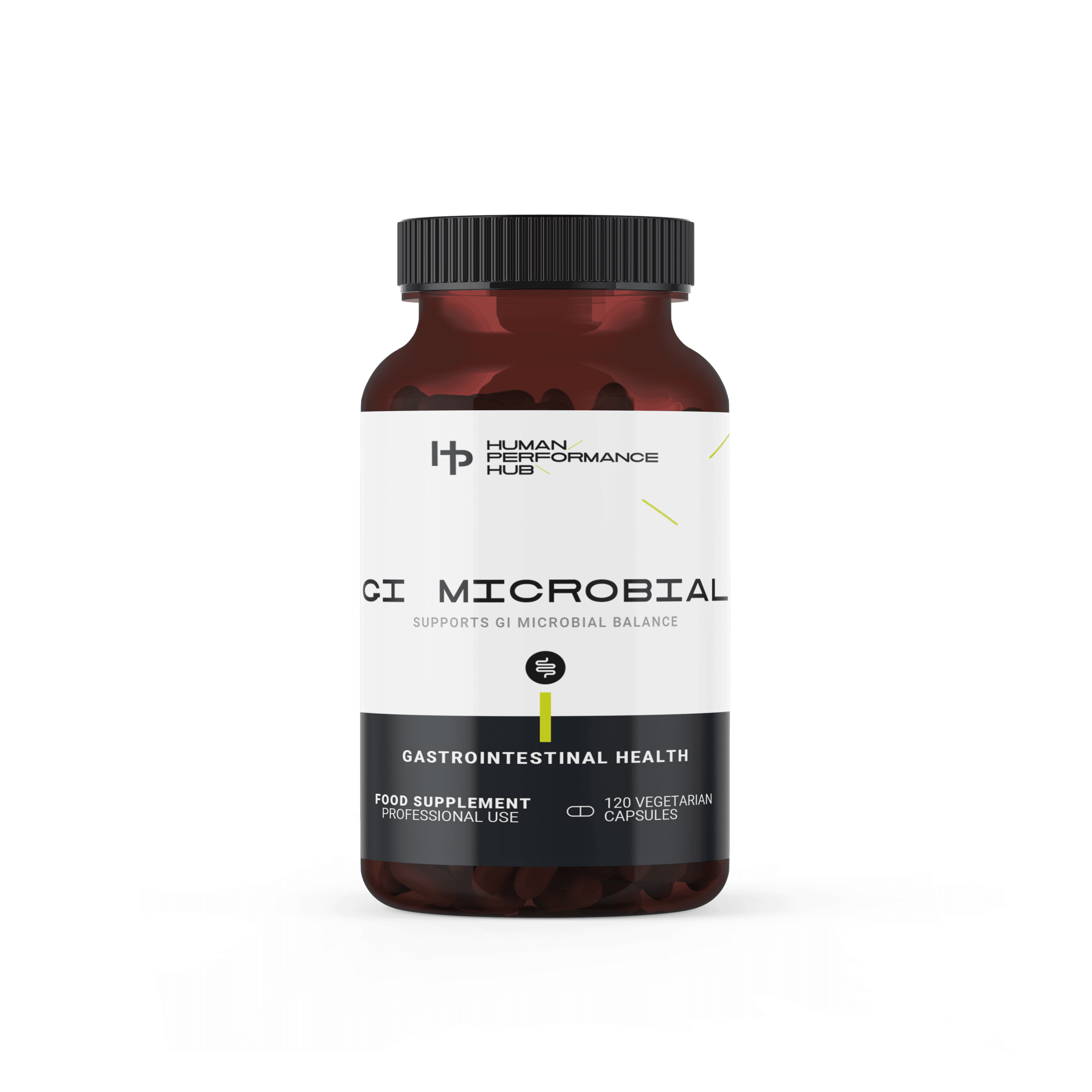Supplementation to maintain a healthy microbial balance.
What Is the GI Microbiome and Why Is It Important?
The human gastrointestinal tract is home to a complex and dynamic community of microbes known as the microbiome. These microbes play a crucial role in maintaining gut health by breaking down food, extracting nutrients, and producing vitamins and other essential compounds for gut health. Dysbiosis, or an imbalance in the microbiome, has been linked to various GI disorders such as inflammatory bowel disease (IBD), irritable bowel syndrome (IBS), and celiac disease. Thus, it is important to maintain a healthy GI microbiome to avoid these problems.
How Can You Promote a Healthy GI Microbiome?
The gut microbiome is a community of trillions of microbes that live in the gastrointestinal tract. These microbes play an important role in digesting food, absorbing nutrients, and protecting against pathogens. This is critical for overall health and well-being.
There are several ways to promote a healthy gut microbiome, including eating quality meat & fish, a variety of plant-based foods, avoiding antibiotics, and exercising regularly. Taking care of your gut microbiome can reduce the risk of developing chronic diseases such as obesity or Crohn’s disease.
The Benefits of a Balanced GI Microbiome
The benefits of a balanced GI microbiome include:
A balanced microbiome is essential for good gut health.
Gut health is linked to several different aspects of overall health, including the immune system and obesity prevention. A healthy gut means a healthy immune system, which can protect against numerous diseases and conditions, therefore, balancing the microbiome is one way to help maintain gut health and improve overall wellness.
A balanced microbiome can help prevent diseases and conditions like obesity, diabetes, and Crohn’s disease.
A properly functioning GI microbiota is beneficial in preventing a variety of chronic health problems, including obesity, type II diabetes mellitus, and Crohn’s disease (a digestive disorder). Prebiotics (foods that promote the growth of probiotic microorganisms) are often recommended as complementary therapies for managing these conditions; however, more research is needed to ascertain their specific benefits for each individual patient.
Tips for Keeping Your GI Microbiome in Balance
One way to promote a healthy gut microbiome is to eat real food that is not manufactured, and introduce prebiotic-rich foods. Probiotics can help balance the gut microbiome and may improve overall health.
If you suspect that your gut microbiome is out of balance, see your doctor or functional medicine practitioner to discuss the options of what will be the best to make improvements. Some ways to improve an imbalance in the gut microbiome include functional nutrition, supporting healthy vitamins and minerals and lifestyle changes.
Introducing GI Microbial
GI Microbial is a supplement that can be taken to improve gut health and maintain a balance of good, bad and not-so-bad bacteria in the gut. This supplement can help improve digestion, reduce inflammation, and boost immunity.
GI Microbial is a targeted blend of nutrients and botanicals with a long history of use for supporting a healthy microbial balance within the gastrointestinal (GI) tract. This proprietary blend of botanicals includes tribulus extract, berberine, bearberry extract, black walnut powder, barberry extract, and artemisinin, along with magnesium and caprylic acid from magnesium caprylate. Research shows that the bioactive constituents in these botanicals possess properties that may help promote a healthy balance of normal gut flora.
The gut microbiome — or the community of beneficial bacteria, fungi, yeast, and other microbes that live in our gut — plays an essential role in health, affecting metabolism, nutrient absorption, and immune function.
The gut microbes ferment foods, help prevent the growth of harmful bacteria, work to manufacture hormones and neurotransmitters, and produce certain vitamins; however, ageing, exposure to antibiotics, poor diet, and stress may potentially disrupt the microbial balance in the gut.
Balance is important for the proper functioning of the gut microbiome in the GI system, and the ingredients in GI Microbial work synergistically to help support a normal balance in the gut microbiome.
GI Microbial Ingredients
Tribulus Extract (Tribulus Terrestris)
The Tribulus Extract (Tribulus Terrestris) is a shrub native to tropical, subtropical, and desert climates, such as those found in Southern Europe, Southern Asia, and the Middle East. For centuries, Chinese and Indian traditional medicine has used this herb to support a range of conditions, most commonly male fertility. Still, it also exhibits antibacterial properties against several types of pathogenic bacteria and yeast. As well as being anthelmintic (kills parasitic worms), it is also larvicidal. It has been speculated that plant extracts have these effects because they are rich in saponins and alkaloids.
Berberine Sulfate (Berberis aristata) and Barberry Extract (Berberis spp.)
The alkaloid berberine is a bitter-tasting yellow alkaloid found in Oregon grape roots, rhizomes and stem bark. Although berberine is best known for supporting blood sugar metabolism, it also has antimicrobial, antiviral, and antiparasitic properties. Due to its usage in traditional Chinese medicine for thousands of years, it has been called an “Eastern antibiotic” for its effectiveness against GI pathogens. The bioactive constituent of berberine, as well as possessing antimicrobial properties, may also support gut health by improving tight junctions in the gut and reducing intestinal permeability, as observed in a laboratory study of epithelial cells of the human gastrointestinal tract.
Artemisinin (Artemisia annua; Sweet Wormwood)
Artemisia annua’s inner bark produces artemisinin. Known for killing parasitic worms, it is commonly called “wormwood.” Originally used as an antimalarial, this compound is also effective against parasites causing gastrointestinal symptoms, pathogenic bacteria, fungi, and various viruses, including the human cytomegalovirus, Epstein-Barr virus, herpes simplex type 1, and hepatitis B and C.
Black Walnut Extract (Juglans nigra)
This ingredient has long been used as an intestinal antiparasitic (vermifuge, anthelmintic) in botanical medicine. In addition, it has bactericidal and fungal activity against common GI pathogens. It was found that black walnut contains at least six different bioactive compounds with antibacterial properties, along with some that are antiviral, antifungal, and antiparasitic/antiprotozoal. Cultured human promonocytes treated with black walnut extract demonstrated potent anti-inflammatory effects and inhibited the secretion of several inflammatory cytokines.
Bearberry Extract (Arctostaphylos uva-ursi)
The botanical name of this plant is derived from the Greek words arktos, meaning “bear”, and staphyle, meaning “bunch of grapes” – bears eat these grape-like clusters of fruit in the wild. Hailing from the Latin name uva-ursi means “grape of the bears.”, medicinal uses of this plant date back to the 13th century in regions of Asia, North America, and subarctic Europe. During digestion and liver function, uva-ursi produces a compound called butoxide, which is converted to hydroquinone.
GI and urinary tract infections can be treated with hydroquinone, and urolithiasis can be treated with uva-ursi. In addition to being antibacterial, uva-ursi has antimicrobial properties against P. aeruginosa (an opportunistic pathogen that can cause many infections, particularly in people with weakened immune systems).
Caprylic Acid
The medium-chain fatty acid caprylic acid, also called octanoic acid, is found naturally in coconut and palm kernel oils and breast milk. In addition to lauric acid, caprylic acid shares some antimicrobial properties with the 12-carbon MCFA. It penetrates and disrupts bacterial cell membranes and reduces biofilm formation, and is effective against certain lipid-coated bacteria, such as S. aureus, various Streptococcus species and intramucosal Candida.
Caprylic acid may boost the effectiveness of antimicrobial agents, such as GI Regenerate when combined with them. However, the damaging effect of caprylic acid on bacterial membranes may facilitate the entry of antimicrobials and antifungals into the cytoplasm, resulting in cell death. The antibacterial effects of caprylic acid can be seen against various gram-positive and gram-negative bacteria.
The Benefits of Supplementing with Microbial:
- Supports GI microbial balance
- Supports the body’s immune responses
- Supports immune health in the GI tract
- Supports gut health
Recommend Use:
We recommend following the below schedule to reach the recommended dose:
- Start by taking 1 capsule per day before bed
- After 3 days, increase your dosage to 2 capsules
- After a further 3 days, increase your dosage to include 1 capsule between breakfast and lunch
- After a further 3 days, increase your dosage to include1 capsule between lunch and your evening meal
- The maximum dosage is 6 capsules per day. If you reach this dosage, you will need to titrate down to 0.
Order GI Microbial From Human Performance Hub Today
In addition to providing us with a means of digesting foods, the gastrointestinal tract also plays a crucial role in preventing illness.
That is why it is essential to look after it.
GI Microbial by Human Performance Hub acts as your insurance against microbial imbalance and works to promote overall gut health.
Order your GI Microbial today and start taking your gut health seriously.

Further Reading
Is gut health something you’d like to explore in more detail? Our articles and resources on the subject can be found here:
🔗 The Gut – Health Connection: What you Need to Know
🔗 L-glutamine benefits for your gut, brain, muscles and more…
🔗 Foundation Series: Gut and Brain – The Immune system
🔗 Leaky Gut, Gluten, and Inflammation: What’s the Connection?
🔗 GI Regenerate Powder (225g) – Peach Flavour
Consultations
We’re always here to help. If you have any questions or would like advice on nutrition, supplements or training, please book a consultation



